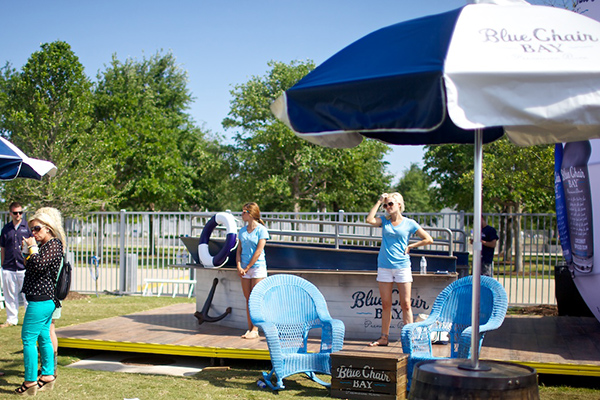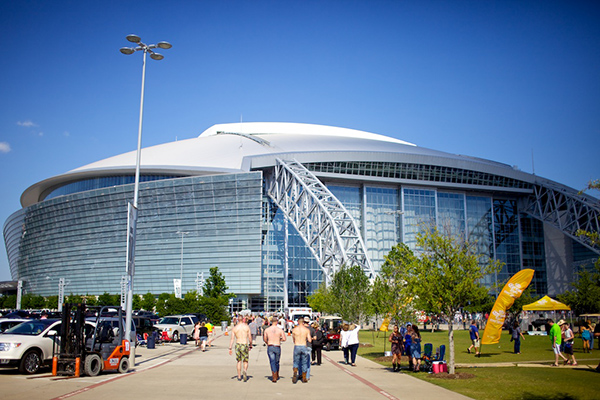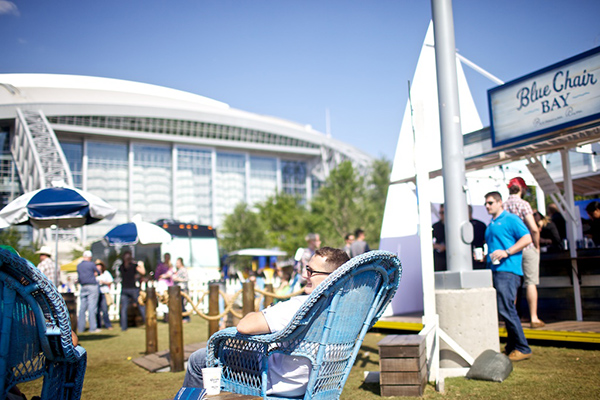Kenny Chesney invited me to have a drink one day last month. I was in my car, and the wildly successful pop country singer was on my radio—but in his brief promotional conversation with the enthusiastic network host, Chesney made an appeal to his fans. If I enjoy his music, he says—and I do—he suggests I come on over to Cowboys Stadium for his upcoming show, and drop by his tailgate party while I’m at it, where he’ll debut his new Blue Chair Bay Rum. I’ll love the rum, he says, because it’s as authentic as anything he’s ever done.
I do like Chesney’s work—the party tunes packed with satisfying rhymes, the moody songs about broken relationships that are more honest and complex than most country love songs you hear today—but “authentic” isn’t the first word I’d use to describe the man who gave us “All I Want For Christmas Is a Real Good Tan.”
Blue Chair Bay Rum, the next great tentacle of Chesney’s growing empire, is named for his peaceful “Song From an Old Blue Chair.” It’s on the 2002 album No Shoes, No Shirt, No Problems that began Chesney’s journey from Nashville to the islands, a transition from a typical country crooner to a self-styled Second Coming of Jimmy Buffett. In such a transformation, he often sings, there is promise for all of us, a new life beyond the troubled world we know. He was once like us, a small person raised on small-town worries—but now look. He can take us there if we’re willing to go.
Now his songs are great party romps and moody tales of hookups, all beginning with an escape to the islands from some small town.
No one else in pop country is so gravely self-important. Chesney sings about pirate parties and benders at tiki bars, but when he speaks it’s like he’s reading someone’s diary. As he reflects in a promo for a mobile radio app, “A world without music would be lost, it would be emotionless.”
As the Wall Street Journal noted, Chesney has spun this earnest party bro persona into the nation’s top-selling touring act, in any genre, over the last 10 years, fueled by a fan base named the “No Shoes Nation.” In his music, his apparel line, and his sold-out stadium shows, he sells the same promise, that what he has to offer is not just fun, but something particularly real and true.
His Cowboys Stadium show in May would begin another summer under Chesney’s island-themed revival tent. I decided to go and see for myself.
COWBOYS STADIUM LOOKS LIKE a spaceship parked between a Walmart parking lot and a few of the strip malls that separate Dallas and Fort Worth. Today, something even stranger is docked beside the stadium: the Blue Chair Bay Rum sailboat bar. It’s not really a boat, just a wooden platform with some nautical embellishments.
Brand promoters in tight tank tops snap photos of fans in weathered blue rocking chairs, and pass out pamphlets about the rum. On the first page, in someone’s (Chesney’s?) handwriting, is that story about the singer’s New Year’s baptism by sand. The bar serves three special Blue Chair Bay Rum cocktails for the occasion. I get a “Pirate Flag,” a plastic cup half-full of coconut rum, and a Diet Coke.
Chesney has promised authenticity here today, so I look around and wonder what is the most real thing about this: the promo bar that looks like a boat, maybe, or the wood-and-rope “gangway” over the grass you cross as you wait in line. If nothing else, there are people here truly having a great time, and Blue Chair Bay Rum is authentically helping them do it.
“Aw, that’s a drink you drink to get drunk!” declares a squirrely ghoul of a man, a dangerously waifish guy in black jeans and a tank-top strolling over to share the news with a buddy. I walk the opposite way and set my drink on a barrel. A couple dressed as pirates get drinks from the bar, then get back in line for seconds. A steady stream of swimsuits, tattoos, boots, and leis passes this little party cove on the way across the sunny parking lot into the show. Just outside the tailgate, a 50-something woman wearing a cape starts jerking her halter top over her head, overcome with the “No Shoes, No Shirt” spirit. Her friends grab at her arms to stop her. “Oh no,” a younger woman behind me says as she takes in the depravity. And then she yells: “Mama, put it back on!”

CHESNEY GREW UP IN the east Tennessee town of Luttrell, and his early career is full of songs—often written by someone else—about life in small towns like his, sentimental ballads about love and family. A narrator he often employs has always dreamed of leaving, but impregnates his high school girlfriend, marries her out of a sense of duty, raises the child, and realizes by the song’s end that he made the right decisions all along.
Shortly after releasing an album of those early greatest hits, Chesney learned his fiancée was breaking off their engagement. Despondent and probably drunk on New Year’s Eve 2001, Chesney fell asleep in a blue rocking chair on the beach, and his literal awakening in that chair the next morning became a powerful symbol for the next chapter of his life. When he came to, “to a thousand mosquito bites, I swear,” as the song goes, he decided it was time to take charge of his life. Chesney the island boy was born.
Like all great ideas, Blue Chair Bay Rum owes its existence to Kenny Chesney watching the sun set on the water. He says he was sitting on the bow of his boat in the Caribbean later that New Year’s Day, as the sun sink into the water, and thought, “What if I could just bottle this up?” That’s how he it goes in the press materials, anyway. The sentiment sometimes takes different forms, as in Chesney’s explanation to USA Today: “I’m trying to bottle all those emotions up.”
Blue Chair Bay Rum is really, authentically inside that bottle, even if its path from Chesney’s blissed-out mind to your plastic party cup runs through a few manufactured channels.
There is no place called Blue Chair Bay, for instance, besides the online Blue Chair Bay store that sells Chesney’s apparel. A New York-based beverage consultant called Savvy Drinks markets the rum, and the Nashville-based strategic advisory firm FLO{thinkery} helps to promote it. According to the Upstart Business Journal, FLO{thinkery} “will distribute Chesney’s rum using a Big Data strategy that includes looking at the social graph, radio play and record sales for the star.” Maybe a part of this strategy, Blue Chair Bay’s white rum is “aimed at women,” USA Today noted. Another mark of the brand’s “born on the beach” authenticity is the rum’s origin at the 120-year-old West Indies Rum Distillery in Barbados, a distinction that puts it in rare company with the likes of Malibu rum, Popov Vodka, and Crystal Springs bottled water.

INSIDE A BAR IN the stadium, speakers play a recording of Chesney retelling the story of his New Year’s Eve awakening. I buy another Blue Chair Bay specialty drink, a “Shooting Star,” which is spiced coconut rum mixed with Red Bull. I know this is an authentic Chesney favorite because—thank the gods of synergy—he sings about drinking it on his new album’s title track.
It’s still midway through the four-hour run of opening acts, and with nothing to do in the crowded stadium, I escape for a minute and lay on some steps just outside, listening to a country radio station booth playing “No Shoes, No Shirt, No Problems” and more of Chesney’s island hits. Apart from the music, it’s quiet out here, and a cool breeze carries me off to reflect on what a nice moment this is. From the heart of Dallas-Fort Worth sprawl, it’s not long before I’m daydreaming about a wave running up a beach and over my feet.
As he and his songs continued to reach new listeners, Chesney only got more earnest, full of reverence for this new life of drinking with strangers and passing out in chairs. He seems less invested, in retrospect, in all those tales of down-home domestic bliss that buoyed him for so long. He spent more than five years singing about the troubles and rewards of married life, from “Someone Else’s Hog” to “The Good Stuff.” But when Renee Zellweger filed divorce papers after just a few weeks of marriage to him, citing “fraud” as the reason, Chesney explained to Anderson Cooper: “The only fraud that was committed was me thinking that I really understood what it was like to be married, and I really didn’t.”
Now his songs are great party romps and moody tales of hookups, all beginning with an escape to the islands from some small town. While Jimmy Buffett’s pirate persona emerges fully formed after decades of bad decisions on the water, Chesney forever has one foot in the Tennessee mud and one in the sand. As he has told People, “The day I stopped trying to be George Strait and started being Kenny Chesney was the day things turned around for me.” But the reality Chesney is selling is escape from wherever you are to a life like his. He’s even got a song about it: “Reality.” “Let’s take a chance and live this fantasy,” he sings, “come on people, break free.”
If I tip my head back far enough, I can pretend the stadium isn’t even there, leaving just the blueness of the sky. I could be anywhere at all.
“That guy’s drunk right there!” shouts a guy walking past with a few friends. I’m too sober not to be annoyed, but in the “No Shoes” spirit, I throw them a big wave and a smile. All four shoot back an enthusiastic thumbs-up. “Tag me in your Facebook post!” one of them yells.

WE ARE IN STADIUM chairs, tens of thousands of us, watching the 12,000-foot high-definition video screen inside the cavernous, sound-swallowing Cowboys Stadium for signs the show is about to start. On the floor, a select few thousand fans will get to join Chesney’s island party of the mind while standing on authentic sand.
Chesney emerges into the spotlight, sprinting down the stage, and the stadium erupts in cheers. Guitars and drums start up, Chesney turns around with a skip-jump, arms out airplane-style, a rhythmic gymnastics move, and in the excitement of the moment it’s easy to miss what a strange moment it is. His stage banter seems sincere, but the cavernous stadium swallows up words and syllables. From up high, I can only pick out a few words at a time. “Texas … this song is about a dream … chase it,” I hear at one point, “…music is the most powerful….”
He is enthusiastic, making deliberate gestures of his left hand at every line he sings, working with great effort to hold the stadium on his own, all five-foot-seven of him without the hat, and no costumes, no pyrotechnics except whatever turned him five shades more orange than anything else in sight. Springsteen does it with manic abandon, sprinting across the stage; Chesney’s show seems just as exhausting, but pained. Every pause for breath is a chance to tip the microphone back with a flourish, or cock his head toward some unsuspecting corner of the stadium. Pacing the stage, he squares his shoulders to the crowd like a boxer throwing a punch, waits a beat, and whips his head forward with a smile. There are five Kenny Chesneys reproduced on video screens above, plus the real one down below trying to prove to us just how real he is.
He promises the crowd, before he sings it, that “Out Last Night,” is “an incredibly authentic song … just kind of a play-by-play of what happened.” In another song he describes, “the smell of Sunday chicken after church,” and reassures us: “I know what that smells like, I promise you.”
Despite the careful brand promotion, the New York marketing operations, and the obvious cross-platform synergy, I was buying the authenticity before the show began—but now, it all seemed strange, and a little goofy. A big stadium performance like this, you don’t expect soul-baring honesty, nor should you expect it. If you’re going to put in all this work on a stage production, why sell it as anything else?
Chesney begins “The Boys of Fall,” a song about football that this Cowboys Stadium crowd will, of course, go nuts for. He brings two actual Dallas Cowboys onstage before the song begins, and when the it builds to its peak, Chesney makes his big move at connecting with the crowd. He grabs a signed Cowboys helmet from the back of the stage, walks it down the catwalk surrounded by fans, leans over, and points to a little boy, maybe three years old.
And as his father gingerly places him on the stage at Chesney’s feet, projected across hundreds of square feet of video board, it becomes clear that this kid is terrified. He reaches back for his father, and Chesney smiles and keeps on singing. The crowd noise is just as loud. Chesney won’t let on that anything’s wrong, but as soon as he places the helmet on the boy’s head, he flings it off, bawls, and reaches for his father. Chesney throws his head back, smiles, and keeps on singing, but not before treating us all to something truly rare and entertaining, truly authentic.





